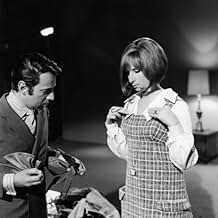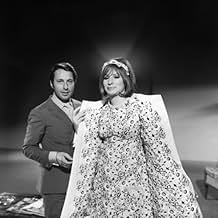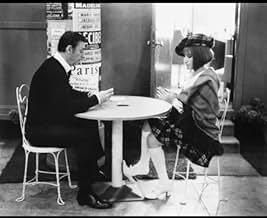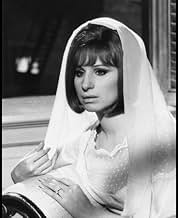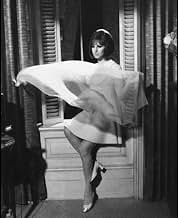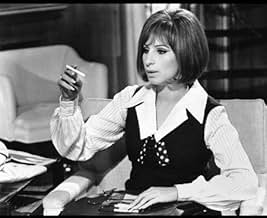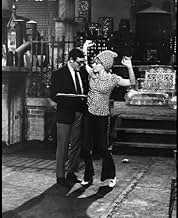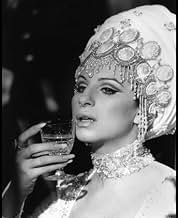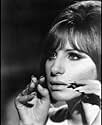VALUTAZIONE IMDb
6,4/10
4396
LA TUA VALUTAZIONE
Aggiungi una trama nella tua linguaA troubled young woman who visits a psychotherapist to help her quit smoking undergoes hypnosis and finds herself reliving a tragic Victorian romance from a past life.A troubled young woman who visits a psychotherapist to help her quit smoking undergoes hypnosis and finds herself reliving a tragic Victorian romance from a past life.A troubled young woman who visits a psychotherapist to help her quit smoking undergoes hypnosis and finds herself reliving a tragic Victorian romance from a past life.
Trama
Lo sapevi?
- QuizAccording to the 1974 biography "Barbra Streisand: The First Decade", this was originally envisioned as a three-hour "road show" extravaganza, and included many sequences of Daisy's other lives (photos of which were printed in some pre-release promotions), but director Vincente Minnelli and the studio felt it would be too long, especially since musicals had already begun to fail at the box office. In addition to all but the briefest of Jack Nicholson's scenes being cut, a musical number sung by him and Streisand, "Who Is There Among Us Who Knows?," was also cut, as well as "Wait Till We're Sixty-Five," a duet between Larry Blyden and Barbra Streisand. Producer Howard W. Koch conducted a search for the deleted footage in 1994, particularly Nicholson's song, which he wanted to showcase during the AFI tribute to the actor. Nothing turned up at Paramount. Koch asked Streisand and Minnelli's widow if they had remnants of the cut footage, but neither did. Koch determined that if the film still exists, it's probably in a mislabelled canister.
- BlooperThe telephone ring in Chabot's office is not a typical Bell company ring, even though the story is supposedly set in New York.
- Citazioni
Dr. Marc Chabot: I used to be in love with answers, but since I've known you I'm just as astounded by questions. Answers make you wise, questions make you human.
- ConnessioniFeatured in Paramount Presents (1974)
Recensione in evidenza
ON A CLEAR DAY opens with two extraordinary sequences. Firstly, with Babs singing the title song, there is a montage of flowers growing at speed in front of our very eyes, a decisively Minnellian melange of colour and artifice to create a real eye-dazzlingly emotional explosion which reaches an ecstatic crescendo as Babs skips through a maze of floral abundance. This is followed by a chilling, antithetical credits sequence, a VERTIGOesque assembly-line of diminishing rectangles in cool, gorgeous colours, in which the familiar Broadway music feels distorted and distant.
These two sequences encapsulate the film's conflict - between heart and mind; emotion and intellect; freedom and order; dream and reality; self-expression and conformity. In 1970, the age of BONNIE AND CLYDE, M*A*S*H and WOODSTOCK, a Minnelli/Lerner/Streisand musical must have seemed amusingly quaint, but today, we can marvel at its audacity and flair, while many of its more acclaimed contemporaries seem tinny and shrill.
The narrative proper seems initially mundane after such abstract excess. Daisy Gamble (perfect name!) interrupts a lecture by famed psychologist, Marc Chabot, being accidentally hypnotised as he demonstrates on a pupil. She is a scatty, ditzy loudmouth who has come to Chabot in the hope that he will manipulate her out of a 5-packs a day smoking habit to please her ultra-conformist fiance, Warren, who has a career-crucial business dinner.
Chabot has little interest in this clumsy pest until he discovers that she has some psychic powers. Intrigued, he explores her through hypnosis and discovers her past-life as a supremely resourceful, sexually magnetic, orphaned Cockey golddigger of the Regency, who is standing trial for espionage and treason, her caddish husband having deserted her. Chabot begins to fall in love with this remarkable woman, and believing, against all his rationalist principles, in reincarnation.
Even by Minnelli's standards, this is a bravely open-ended picture, not only in its unexpected denouenment, but in refusing to simplify the bewildering, complicated emotions his characters become prey to. On a simple structural level, he contrasts conformity with the life of emotion and imagination. Chabot is a doctor whose devotion to science and facts is almost monkish in its celibate form. His office is the embodiment of conformity, a bland brown pervading walls, chairs, fittings, barred windows, books, even his own clothes. Despite being Yves Montand, he is no French lover.
Into his life comes this impossible woman whose striving for fiance-pleasing order results in further chaos. In her second incarnation, as Melinda, she brings bawdiness, vulgarity, romance, humour, daring, but, most of all, colour, sumptuous, ravishing, blinding colour. The effect she has on Chabot is reflected in the film's form, which moves from steady, mid-level, classical compositions, to outrageous fancy, dizzying camera movements, mercurial editing cutting across time and space. Chabot soon begins to have Daisy's dreams, while she becomes divided from herself in a remarkable visualisation of the split between duty and desire.
But it's not enough to suggest simplistic dichotomies - even the 'normal' Daisy has a rooftop garden which is simply magical (isn't that such a lovely idea, a woman who makes flowers grow quickly by talking to them?), while her fiance, like Darrin from BEWITCHED, is so desperate to conform that he becomes mad. 'Sciences', such as psychoanalysis are invoked in the spirit of the times, but the Pandora's Box they open in no way 'explain', but sets free, as Chabot ruefully recognises.
This is all significantly gendered as men try to control and explain a woman who darts gleefully through history, place, morality, while barely taking a break. As ever with Minnelli, the celebration of artifice only reveals how repressive real-life is, and his satire is cutting if you care to look. This is an undervalued, joyous, sad coda to one of Hollywood's greatest careers (Minnelli would go on to make only one more movie), as full of invention and love as his first film, CABIN IN THE SKY.
The music is fine, with little of the heartache as GIGI or fun of MY FAIR LADY. Montand is charming in a thankless role, but Barbara Streisand - and, God help me, I never thought I'd say this - is an absolute joy in a double (treble?) role, especially convincing in saucy period dress, yet, moving when she needs to be.
These two sequences encapsulate the film's conflict - between heart and mind; emotion and intellect; freedom and order; dream and reality; self-expression and conformity. In 1970, the age of BONNIE AND CLYDE, M*A*S*H and WOODSTOCK, a Minnelli/Lerner/Streisand musical must have seemed amusingly quaint, but today, we can marvel at its audacity and flair, while many of its more acclaimed contemporaries seem tinny and shrill.
The narrative proper seems initially mundane after such abstract excess. Daisy Gamble (perfect name!) interrupts a lecture by famed psychologist, Marc Chabot, being accidentally hypnotised as he demonstrates on a pupil. She is a scatty, ditzy loudmouth who has come to Chabot in the hope that he will manipulate her out of a 5-packs a day smoking habit to please her ultra-conformist fiance, Warren, who has a career-crucial business dinner.
Chabot has little interest in this clumsy pest until he discovers that she has some psychic powers. Intrigued, he explores her through hypnosis and discovers her past-life as a supremely resourceful, sexually magnetic, orphaned Cockey golddigger of the Regency, who is standing trial for espionage and treason, her caddish husband having deserted her. Chabot begins to fall in love with this remarkable woman, and believing, against all his rationalist principles, in reincarnation.
Even by Minnelli's standards, this is a bravely open-ended picture, not only in its unexpected denouenment, but in refusing to simplify the bewildering, complicated emotions his characters become prey to. On a simple structural level, he contrasts conformity with the life of emotion and imagination. Chabot is a doctor whose devotion to science and facts is almost monkish in its celibate form. His office is the embodiment of conformity, a bland brown pervading walls, chairs, fittings, barred windows, books, even his own clothes. Despite being Yves Montand, he is no French lover.
Into his life comes this impossible woman whose striving for fiance-pleasing order results in further chaos. In her second incarnation, as Melinda, she brings bawdiness, vulgarity, romance, humour, daring, but, most of all, colour, sumptuous, ravishing, blinding colour. The effect she has on Chabot is reflected in the film's form, which moves from steady, mid-level, classical compositions, to outrageous fancy, dizzying camera movements, mercurial editing cutting across time and space. Chabot soon begins to have Daisy's dreams, while she becomes divided from herself in a remarkable visualisation of the split between duty and desire.
But it's not enough to suggest simplistic dichotomies - even the 'normal' Daisy has a rooftop garden which is simply magical (isn't that such a lovely idea, a woman who makes flowers grow quickly by talking to them?), while her fiance, like Darrin from BEWITCHED, is so desperate to conform that he becomes mad. 'Sciences', such as psychoanalysis are invoked in the spirit of the times, but the Pandora's Box they open in no way 'explain', but sets free, as Chabot ruefully recognises.
This is all significantly gendered as men try to control and explain a woman who darts gleefully through history, place, morality, while barely taking a break. As ever with Minnelli, the celebration of artifice only reveals how repressive real-life is, and his satire is cutting if you care to look. This is an undervalued, joyous, sad coda to one of Hollywood's greatest careers (Minnelli would go on to make only one more movie), as full of invention and love as his first film, CABIN IN THE SKY.
The music is fine, with little of the heartache as GIGI or fun of MY FAIR LADY. Montand is charming in a thankless role, but Barbara Streisand - and, God help me, I never thought I'd say this - is an absolute joy in a double (treble?) role, especially convincing in saucy period dress, yet, moving when she needs to be.
- alice liddell
- 11 giu 2000
- Permalink
I più visti
Accedi per valutare e creare un elenco di titoli salvati per ottenere consigli personalizzati
- How long is On a Clear Day You Can See Forever?Powered by Alexa
Dettagli
Botteghino
- Budget
- 10.000.000 USD (previsto)
- Lordo Stati Uniti e Canada
- 14.000.000 USD
- Lordo in tutto il mondo
- 14.000.000 USD
Contribuisci a questa pagina
Suggerisci una modifica o aggiungi i contenuti mancanti

Divario superiore
By what name was L'amica delle 5½ (1970) officially released in India in English?
Rispondi
